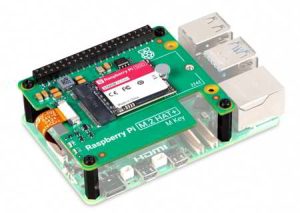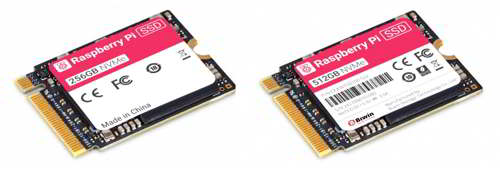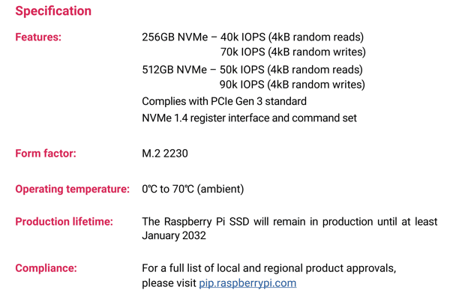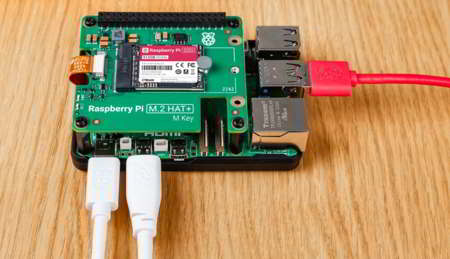Raspberry Pi with Branded NVMe PCIe Gen 3 M.2 2230 SSDs and SSD Kits for Raspberry Pi 5 Nano-Computer
$30 (256GB), $45 (512GB), and $55 for kit., minimum 4KB random RW performance of 40,000 IO/s and 70,000 IO/s respectively for 256GB model
This is a Press Release edited by StorageNewsletter.com on October 31, 2024 at 2:01 pmTo help users get the best out of the nano-computer Raspberry Pi 5, Raspberry Pi Ltd. launching a range of branded NVMe SSDs.

They are available both on their own and bundled with M.2 HAT+ as ready-to-use SSD Kits.
When the company launched Raspberry Pi 5, almost exactly a year ago, its chief executive thought the thing people would get most excited about was the 3-fold increase in performance over 2019’s Raspberry Pi 4. But very quickly it became clear that it was the other new features – the power button, and the PCIe port – that had captured people’s imagination.
Raspberry Pi have seen everything from Ethernet adapters, to AI accelerators, to regular PC graphics cards attached to the PCIe port. And offer own low-cost M.2 HAT+, which converts from FPC standard to the standard M.2 M-key format, and there are a wide variety of 3rd-party adapters which do basically the same thing. Raspberry Pi have also released an AI Kit, which bundles the M.2 HAT+ with an AI inference accelerator from friends at Hailo.
But the most popular use case for the PCIe port on Raspberry Pi 5 is to attach an NVMe SSD. SSDs are fast; faster even than branded A2-class SD cards. If no-compromises performance is the company’s goal, users will want to run Raspberry Pi OS from an SSD, and Raspberry Pi SSDs are the choice. The entry-level 256GB drive is priced at $30 on its own, or $40 as a kit; its 512GB is priced at $45 on its own, or $55 as a kit. Both densities offer minimum 4KB random read and write performance of 40k IO/s and 70k IO/s respectively.
The entry-level 256GB drive is priced at $30 on its own, or $40 as a kit; its 512GB is priced at $45 on its own, or $55 as a kit. Both densities offer minimum 4KB random read and write performance of 40k IO/s and 70k IO/s respectively.
The 256GB SSD and SSD Kit are available to buy, while the 512GB variants are available to pre-order for shipping by the end of November.
Raspberry Pi 5 nano-computer with M.2 HAT+ and SSD















 Subscribe to our free daily newsletter
Subscribe to our free daily newsletter

